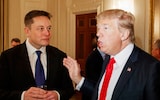UK minister Nick Thomas-Symonds is in Brussels today (15 July), after his Labour government was elected with a massive mandate to reset relations with the EU.
Prime Minister Keir Starmer has pledged to fix a “botched” Brexit deal, promising to ease border checks for animals and touring musicians – but has remained relatively quiet about what he might do for the UK’s totemic financial services sector.
The industry itself appears hopeful it could gain from warmer EU relations, but is still cautious about what can be achieved after so much Brexit heartache.
“I hope there is a more positive and constructive working relationship between the United Kingdom government and the EU,” Chris Hayward, Policy Chairman of the City of London Corporation, told Euronews, adding: “We want to ensure that there are no barriers to market access internationally.”
The UK’s financial sector, which on some measures represents 12% of the country’s economic output, bore the brunt of increasingly fractious Brexit talks.
Boris Johnson’s exit deal promised a relationship based on equivalence – where UK rules are deemed similar enough to EU ones that there can be limited market access for specific sectors.
But even there, Brussels dragged its feet, only offering equivalence in one area – for financial clearinghouses.
The EU only signed a memorandum setting out the details of cooperation several years later in 2023, after a wider impasse concerning the Northern Ireland border had been resolved.
Hayward, who represents the local authority that also serves as de facto lobbyist for the financial sector it houses, is frank that – after so much tumult – progress won’t be quick.
“After a seven or eight-year painful divorce, you don't just suddenly start to plough back in, as if nothing had happened,” he said. “There's a need to rebuild trust ... that takes time.”
Back seat
The financial sector has certainly taken a back seat in public pronouncements over the UK’s EU reset.
Starmer’s Downing Street and UK foreign secretary David Lammy have pointed to supporting Ukraine and tackling climate change as likely areas of cooperation.
It might be a stretch, though not impossible, to tuck financial stability issues into a promised new UK-EU security pact.
But many in the financial sector argue that it’s too late to put the genie back in the bottle.
Unlike, say, the automotive sector, finance had the resources to adapt – and now regards that as a sunk cost.
"Nobody in London is expecting any of what has moved from the UK to the EU to ever come back,” said William Wright, managing director of think tank New Financial, citing around 500-odd City firms who’ve now sought new licenses, opened offices, or moved staff to the EU.
What’s gone is gone, says think tank director
Adapting to Brexit “hasn't been fun,” but “what’s gone is gone,” Wright told Euronews.
Those changes mean UK-based financiers still get the access they need in practice, as do EU companies seeking to issue stocks or raise venture capital – while it’s now too late to reverse the EU decisions that caused stock-market trading to abruptly move from London to Paris and Amsterdam, Wright believes.
Yet there may still be some prizes to be had from warmer relations.
There are still important equivalence decisions up for grabs in EU financial-trading rules known as Mifid, which would allow UK investment firms to serve continental clients more easily.
There could also be a change in the EU’s mindset about how the equivalence system works, spurred in part by single market reforms recently proposed by former Italian Prime Minister Enrico Letta.
One option might be a system where foreign companies can pay to be recognised as complying with EU rules.
Progress in areas such as tech regulation could also aid the innovation-driven financial sector.
Hayward mentioned cooperation on AI as helpful; financiers also say they are hampered by EU restrictions on data flows, or on the use of US cloud computing providers.
Be humble with demands of Europe, Starmer cautioned
Starmer’s pledge for mutual recognition of qualifications could aid finance-adjacent British professionals, such as accountants, who occasionally work in the EU.
But Wright – citing fellow think tanker Charles Grant, of the Centre for European Reform – warns Starmer against undue haste.
“Be humble, take your time, be modest, listen to the EU,” Wright said. “Don't barge in making unreasonable demands.”
If the UK government does succeed in thawing frosty relations, he may find there’s demand coming from the other side of the English Channel, too.
“[Brexit] creates problems for Europe because Europe is more cut off from a very important market, a worldwide market,” Sébastien de Brouwer, deputy CEO at lobby group the European Banking Federation said.
“It’s important that the EU and UK speak to each other,” he said, as diverging regulations “could create some kind of regulatory arbitrage”.
De Brouwer cites recent reforms that threaten to force EU banks to use financial market infrastructure within the bloc rather than in London – potentially harming domestic industry.
The reform “could put European banks on the continent at a disadvantage” compared to UK rivals who have “access to a more deep and liquid market” in London, he said.
Disclaimer: The copyright of this article belongs to the original author. Reposting this article is solely for the purpose of information dissemination and does not constitute any investment advice. If there is any infringement, please contact us immediately. We will make corrections or deletions as necessary. Thank you.



